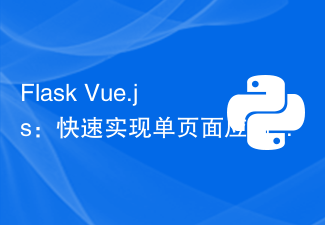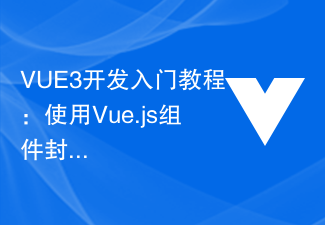 Backend Development
Backend Development PHP Tutorial
PHP Tutorial Teach you how to use PHP and Vue.js to develop best practices for defending against session fixation attacks
Teach you how to use PHP and Vue.js to develop best practices for defending against session fixation attacksTeach you how to use PHP and Vue.js to develop best practices for defending against session fixation attacks
Introduction:
In modern web application development, security and defense against attacks are crucial aspect. One of them is defense against Session Fixation Attack. This article will introduce how to use PHP and Vue.js to develop best practices for defending against session fixation attacks, and provide corresponding code examples.
- What is a session fixation attack?
Session fixation attack is an attack method in which the attacker controls the user's session ID to deceive the user into authorizing and maintaining the session state after knowing the session ID. Attackers usually implement such attacks in the following ways:
a) Pass malicious session IDs to users through phishing methods.
b) Obtain the session ID before the user logs in and pass it to the user.
In this way the attacker bypasses the application's authentication process and thereby gains unauthorized access. - How to defend against session fixation attacks?
The best practice to defend against session fixation attacks is to promptly replace the session ID when generating it, and generate a new session ID before user authentication. Here is sample code to implement this defense using PHP and Vue.js:
PHP example:
<?php
session_start();
function regenerateSessionId(){
session_regenerate_id(true);
}
function loginUser($username, $password){
// 验证用户登录
if($username === 'admin' && $password === 'password'){
regenerateSessionId();
$_SESSION['user'] = $username;
return true;
} else {
return false;
}
}
function logoutUser(){
session_unset();
session_destroy();
}
?>Vue.js example:
// 在登录成功后,获取新的会话ID
function loginSuccess(response){
if(response.data.success){
axios.get('/regenerateSessionId.php')
.then(function(){
// 执行其他操作
})
.catch(function(error){
console.log(error);
});
}
} In the above code In the example, when the user logs in successfully, the PHP backend will call the regenerateSessionId() function to regenerate the session ID and save the user information in the $_SESSION array. The front-end Vue.js code uses the get method of the axios library to send an HTTP request and calls the PHP backend's regenerateSessionId.php script to obtain a new session ID.
Additionally, to enhance security, developers can also take the following steps:
- Protect the transmission of session data by forcing the use of HTTPS.
- Set the Secure and HttpOnly properties of the session cookie to ensure only secure transmission and cannot be accessed through JavaScript scripts.
- Limit the session counter per user to avoid session hijacking.
Summary:
In this article, we introduced the concept of session fixation attacks and provided best practices for developing defenses against session fixation attacks using PHP and Vue.js. This type of attack can be effectively defended against by regenerating the session ID before user authentication. We also provide relevant code examples to help readers better understand how to implement these defense measures. When developing apps, always keep security in mind and take appropriate measures to protect users' data and privacy.
The above is the detailed content of Teach you how to use PHP and Vue.js to develop best practices for defending against session fixation attacks. For more information, please follow other related articles on the PHP Chinese website!
 VUE3基础教程:使用Vue.js插件封装图片上传组件Jun 15, 2023 pm 11:07 PM
VUE3基础教程:使用Vue.js插件封装图片上传组件Jun 15, 2023 pm 11:07 PMVUE3基础教程:使用Vue.js插件封装图片上传组件Vue.js是一款流行的前端框架,它使开发者可以用更少的代码创建更高效、灵活的应用程序。尤其是在Vue.js3发布之后,它的优化和改进使得更多的开发者倾向于使用它。这篇文章将介绍如何使用Vue.js3来封装一个图片上传组件插件。在开始之前,需要先确保已经安装了Vue.js和VueCLI。如果尚未安装
 VUE3快速入门:使用Vue.js指令实现选项卡切换Jun 15, 2023 pm 11:45 PM
VUE3快速入门:使用Vue.js指令实现选项卡切换Jun 15, 2023 pm 11:45 PM本文旨在帮助初学者快速入手Vue.js3,实现简单的选项卡切换效果。Vue.js是一个流行的JavaScript框架,可用于构建可重用的组件、轻松管理应用程序的状态和处理用户界面的交互操作。Vue.js3是该框架的最新版本,相较于之前的版本变动较大,但基本原理并未改变。在本文中,我们将使用Vue.js指令实现选项卡切换效果,目的是让读者熟悉Vue.js的
 Flask + Vue.js:快速实现单页面应用Jun 17, 2023 am 09:06 AM
Flask + Vue.js:快速实现单页面应用Jun 17, 2023 am 09:06 AM随着移动互联网和Web技术的迅速发展,越来越多的应用需要提供流畅、快速的用户体验。传统的多页面应用已经无法满足这些需求,而单页面应用(SPA)则成为了解决方案之一。那么,如何快速实现单页面应用呢?本文将介绍如何利用Flask和Vue.js来构建SPA。Flask是一个使用Python语言编写的轻量级Web应用框架,它的优点是灵活、易扩
 VUE3基础教程:使用Vue.js插件封装日历组件Jun 15, 2023 pm 09:09 PM
VUE3基础教程:使用Vue.js插件封装日历组件Jun 15, 2023 pm 09:09 PMVue.js是现代化的前端JavaScript框架之一,它提供了一套完整的工具来构建交互式用户界面。在Vue.js的生态系统中,有各种各样的插件和组件,可以大大简化我们的开发流程。在本篇文章中,我们将介绍如何使用Vue.js插件封装一个日历组件,以方便我们在Vue.js项目中快速使用。Vue.js插件Vue.js插件可以扩展Vue.js的功能。它们可以添加全
 Vue.js实现登录验证的完整指南(API、JWT、axios)Jun 09, 2023 pm 04:04 PM
Vue.js实现登录验证的完整指南(API、JWT、axios)Jun 09, 2023 pm 04:04 PMVue.js是一种流行的JavaScript框架,用于构建动态Web应用程序。实现用户登录验证是开发Web应用程序的必要部分之一。本文将介绍使用Vue.js、API、JWT和axios实现登录验证的完整指南。创建Vue.js应用程序首先,我们需要创建一个新的Vue.js应用程序。我们可以使用VueCLI或手动创建一个Vue.js应用程序。安装axiosax
 VUE3开发入门教程:使用Vue.js组件封装chart图表Jun 15, 2023 pm 10:29 PM
VUE3开发入门教程:使用Vue.js组件封装chart图表Jun 15, 2023 pm 10:29 PM随着大数据时代的到来,数据可视化已经成为了现如今的趋势之一。在Web前端开发的过程中,如何使用Vue.js进行数据可视化处理,成为了许多前端开发者所关注的问题。本文将会介绍如何使用Vue.js组件,封装基于chart.js库的图表。1.了解chart.jsChart.js是一款基于HTML5CanvasElement的简单易用、跨平台的开源图表库,我们可
 VUE3基础教程:使用Vue.js自定义事件Jun 15, 2023 pm 09:43 PM
VUE3基础教程:使用Vue.js自定义事件Jun 15, 2023 pm 09:43 PMVue.js是一款流行的JavaScript框架,它提供了很多方便的特性,所以它在开发Web应用程序时非常有用。Vue.js中的自定义事件系统使其更加灵活,并且可以通过组件事件触发和处理来实现更好的代码重用性。在本文中,我们将讨论如何使用Vue.js的自定义事件。Vue.js中自定义事件的基础在Vue.js中,我们可以通过v-on指令来监听DOM事件。例如,
 VUE3开发入门:使用Vue.js动态过滤数据列表Jun 15, 2023 pm 09:10 PM
VUE3开发入门:使用Vue.js动态过滤数据列表Jun 15, 2023 pm 09:10 PMVue.js已经成为现代Web开发的中流砥柱。它是一个轻量级的JavaScript框架,提供了数据绑定和组件化的能力,使得开发者能够更加轻松地构建交互型应用程序。而现在,Vue.js的新版本VUE3也已经面世。在本文中,我们将使用VUE3,通过实例,介绍如何在Vue.js中实现动态过滤数据列表。1.准备工作在开始本教程之前,您需要先安装Node.js和Vue


Hot AI Tools

Undresser.AI Undress
AI-powered app for creating realistic nude photos

AI Clothes Remover
Online AI tool for removing clothes from photos.

Undress AI Tool
Undress images for free

Clothoff.io
AI clothes remover

AI Hentai Generator
Generate AI Hentai for free.

Hot Article

Hot Tools

mPDF
mPDF is a PHP library that can generate PDF files from UTF-8 encoded HTML. The original author, Ian Back, wrote mPDF to output PDF files "on the fly" from his website and handle different languages. It is slower than original scripts like HTML2FPDF and produces larger files when using Unicode fonts, but supports CSS styles etc. and has a lot of enhancements. Supports almost all languages, including RTL (Arabic and Hebrew) and CJK (Chinese, Japanese and Korean). Supports nested block-level elements (such as P, DIV),

ZendStudio 13.5.1 Mac
Powerful PHP integrated development environment

Zend Studio 13.0.1
Powerful PHP integrated development environment

SublimeText3 Chinese version
Chinese version, very easy to use

Safe Exam Browser
Safe Exam Browser is a secure browser environment for taking online exams securely. This software turns any computer into a secure workstation. It controls access to any utility and prevents students from using unauthorized resources.





